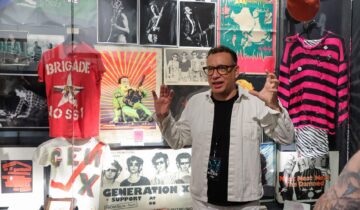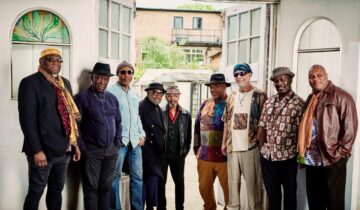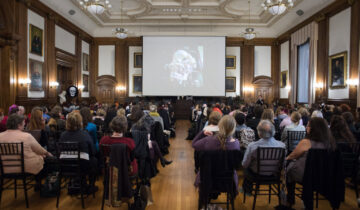 The Pistolera frontwoman has a history of advocacy through her music. Now she’s building on that experience to become a social justice entrepreneur.
The Pistolera frontwoman has a history of advocacy through her music. Now she’s building on that experience to become a social justice entrepreneur.
For RED BULLETIN MAGAZINE: Sandra Velasquez has been a New York City–based musician for 20 years, but her Southern California and Mexican American roots shape all of her creative pursuits. She was raised near the border with her mother, an immigration lawyer and activist, and her father, a homicide detective and artist, who both instilled a sense of social justice in their daughter.
“Growing up, we talked about what’s happening in the law and the world. My mom was on the news a lot, talking about victims of sex trafficking, so what I do musically is not a big deal,” says Velasquez, now 43, downplaying her role as an artist. But in her youth, she says that using music for social change felt normal. “My mom’s whole life has influenced me, using your experience to help others,” she continues. “Now I see clearly that’s what she was doing, and that’s what I try to do in all of my work. Leveling the playing field is what I’m all about.
“To me, from high school on, the only reason to be famous is to use art or music as a platform to bring attention to certain issues,” Velasquez adds. “Songs I wrote 15 years ago about immigrants are still relevant today.”
When she takes the stage as the lead singer and guitarist for the Latin band Pistolera, Velasquez delivers a lively performance with a socially conscious message. The group, which she formed back in 2005, combines rock and accordion-driven cumbia with Spanish lyrics about immigrants’ rights, racism and feminism. Earlier this year, Pistolera played Flushing Town Hall as part of the Carnegie Hall neighborhood concert series, and in the past, they’ve opened for the likes of Los Lobos. (If you’ve watched Breaking Bad or Sons of Anarchy, you might also recognize the band’s special sound.)
But wherever Velasquez appears, her sense of activism comes with her. Her other group, Moona Luna, is a bilingual band that makes Latin music for young people in preschool through 4th grade. Every Moona Luna album has a sustainability theme; their latest is titled Energia. In April, as COVID-19 swept across New York, Lincoln Center asked Moona Luna to do some remote online concerts. Velasquez and her bandmates filmed themselves playing songs at home and synced the video together for the center’s online broadcast.
With her solo project, SLV, Velasquez presents modern music that combines elements of pop, R&B, hip-hop and rock. One of her songs, “Bars of Gold,” is about owning your self-worth. “There was part of me that felt pigeonholed,” Velasquez says about her other projects. “People always expected a certain Latin-music thing, and bars would say, ‘Keep us dancing,’ but I wanted to create a more musical space for myself with other types of tempos.”
Velasquez’s latest endeavor doesn’t involve music, but it uses all the management and promotional skills she learned as a bandleader and the activism she picked up from her mother: She’s become a social justice entrepreneur, keen to create and bolster sustainable, Latino-owned products and get them on shelves next to mainstream grocery store products.
She’s recently become a brand consultant for health-food grocery stores and teaches an online class for entrepreneurs about how to talk to chain stores and distributors. She earned a diploma in organic skin-care formulation and learned how to make artisan soap using the Nopal cactus, commonly known as prickly pear, which is frequently found in Mexico. She hopes to launch her new company, Nopalera, soon.
“So many people in the grocery business are Latino, so why aren’t the products Latino, too?” Velasquez asks. “I want to see as many Latino-owned products on the shelf—not legacy brands like Goya, but new people with new ideas who want to disrupt companies like Nabisco. I realized my activism doesn’t always have to be music—the format can change. Things like soap can be just as impactful as music.”



